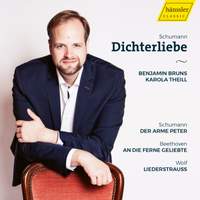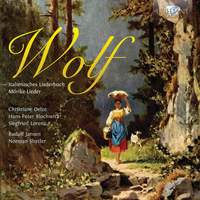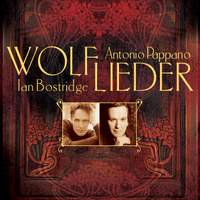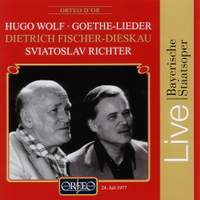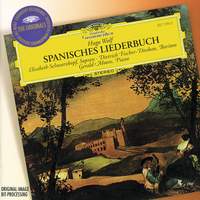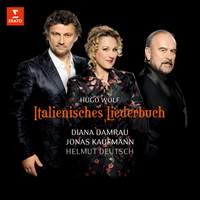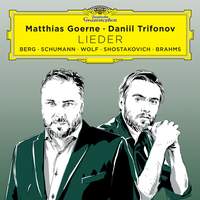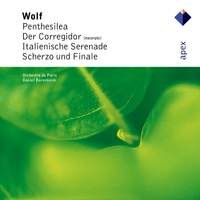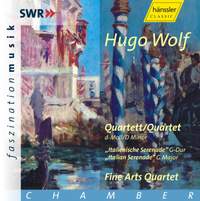Favourites,
Hugo Wolf (1860-1903)
Wolf fits the stereotype of the misunderstood genius quite well; thrown out of three consecutive schools and subsequently out of the Vienna Conservatory for his rebellious behaviour (not least in his style of composition, in which he obstinately refused to play by the rules), he eventually managed to secure an income from benefactors and patrons who saw talent where his teachers had seen only wilfulness.
His music draws on the rich Romanticism of Wagner, and indeed one of his early works is thought to have been written in response to the composer’s death in 1883. As an arch-Wagnerite, he was savage to the point of recklessness in his criticisms of the conservative musical establishment; combined with his tempestuous personality this did little to help his reputation. A lifelong feud with the Brahms-supporting camp would periodically resurface and hamper performances of Wolf’s works.

Despite all this, his music’s undeniable power won out; his intense and often highly compressed Lieder are his main legacy, above all the 1888 Mörike-Lieder in which his own style really starts to flower and move beyond the influence of Schubert, and the later Italienisches Liederbuch and Spanisches Liederbuch from the 1890s. Using a broadly Wagnerian playbook, he deployed harmony as a way to depict the psychological underpinnings of his songs - delayed cadences, unexpected modulations, tensions between two incompatible tonal areas.
There’s a certain irony in Wolf having felt for much of his life that only larger-scale forms truly ‘counted’ and that he was somehow falling short by not composing such works. Although he completed an opera, a symphonic poem and two works for string quartet, it’s his ability to craft miniatures of great emotional concentration that has made him a widely-composed and highly-regarded composer today, with his Lieder a regular fixture of the concert hall.
The Oxford Lieder Festival began a project in 2010 (for the 150th anniversary of Wolf’s birth) to record his entire output of Lieder, on Stone Records; this mighty undertaking remains ongoing today.


Hugo Wolf (1860-1903)
Curated by David Smith
A selection of some of the best recordings of music by the arch-Romantic Lieder composer - best known for his intense, harmonically adventurous Mörike-Lieder, Italienisches Liederbuch and Spanisches Liederbuch. 5 hours 54 minutes
Hugo Wolf (1860-1903) - a selection of great recordings of his music
Nominated at the International Classical Music Awards as well as for the German Record Prize in the category 'Vocal Recital'. (Künstlersekretariat am Gasteig)
Available Formats: CD, MP3, FLAC, Hi-Res FLAC
Wolf: Italienisches Liederbuch, Mörike‐Lieder
Christiane Oelze, Hans‐Peter Blochwitz, Siegfried Lorenz, Rudolf Jansen (piano) & Norman Shetler (piano)
'Three excellent singers (despite Oelze's oddly piping top) in two well-accompanied recitals, covering many of Wolf's most memorable songs.' (BBC Music Magazine, April 2014)
Available Formats: 2 CDs, MP3, FLAC
'If Hugo Wolf is still something of a distant figure for you, then this latest select anthology of his songs should certainly bring them into close focus… Ian Bostridge and Antonio Pappano bring out the best in each other - and in Wolf himself' (BBC Music Magazine)
Available Formats: MP3, FLAC
'Dietrich Fischer-Dieskau grabs these songs by their collective scruff, and summons your attention in this extraordinary 1977 Salzburg Festival recital. Sviatoslav Richter matches the singer’s micro-managed detailing and stupefying intensity. He infuses Prometheus’ extended, demanding piano introduction with the kind of clarity and power that transcends mere virtuosity.' (Jed Distler, ClassicsToday.com)
Available Formats: CD, MP3, FLAC
Wolf, H: Spanisches Liederbuch: selection
Elisabeth Schwarzkopf (soprano), Dietrich Fischer-Dieskau (baritone), Gerald Moore (piano)
'In this superb DG reissue, the sacred songs provide a dark, intense prelude, with Fischer-Dieskau at his very finest, sustaining slow tempi impeccably.' (Penguin Guide, 2011 edition)
Available Formats: MP3, FLAC
Wolf: Italienisches Liederbuch
Diana Damrau (soprano), Jonas Kaufmann (tenor), Helmut Deutsch (piano)
'We’re presented with a welcome alternation of moods which beautifully showcase these musicians’ enormous expressive versatility.' (BBC Music Magazine, April 2019)
Available Formats: CD, MP3, FLAC, Hi-Res FLAC
Lieder: Berg, Schumann, Wolf, Shostakovich, Brahms
Matthias Goerne (bass-baritone), Daniil Trifonov (piano)
'Goerne and the equally probing Daniil Trifonov – a true conversational partner – seem to conceive the whole programme as a brooding mega-cycle on the human condition.' (Gramophone Magazine, October 2022)
Available Formats: CD, MP3, FLAC, Hi-Res FLAC
'Barenboim makes the very most of all these pieces, and they are played with much conviction.' (Penguin Guide, 2011 edition)
Available Formats: MP3, FLAC
'The latest incarnation of the Fine Arts Quartet impels the opening movement’s harmonic obstacle courses decisively and swiftly and sparks the Scherzo’s coiled lilt with snarling accents... A silver-toned, scampering rendition of Wolf’s witty and concise Italian Serenade makes a delightful encore. Warmly recommended' (Jed Distler, ClassicsToday.com)
Available Formats: CD, MP3, FLAC



